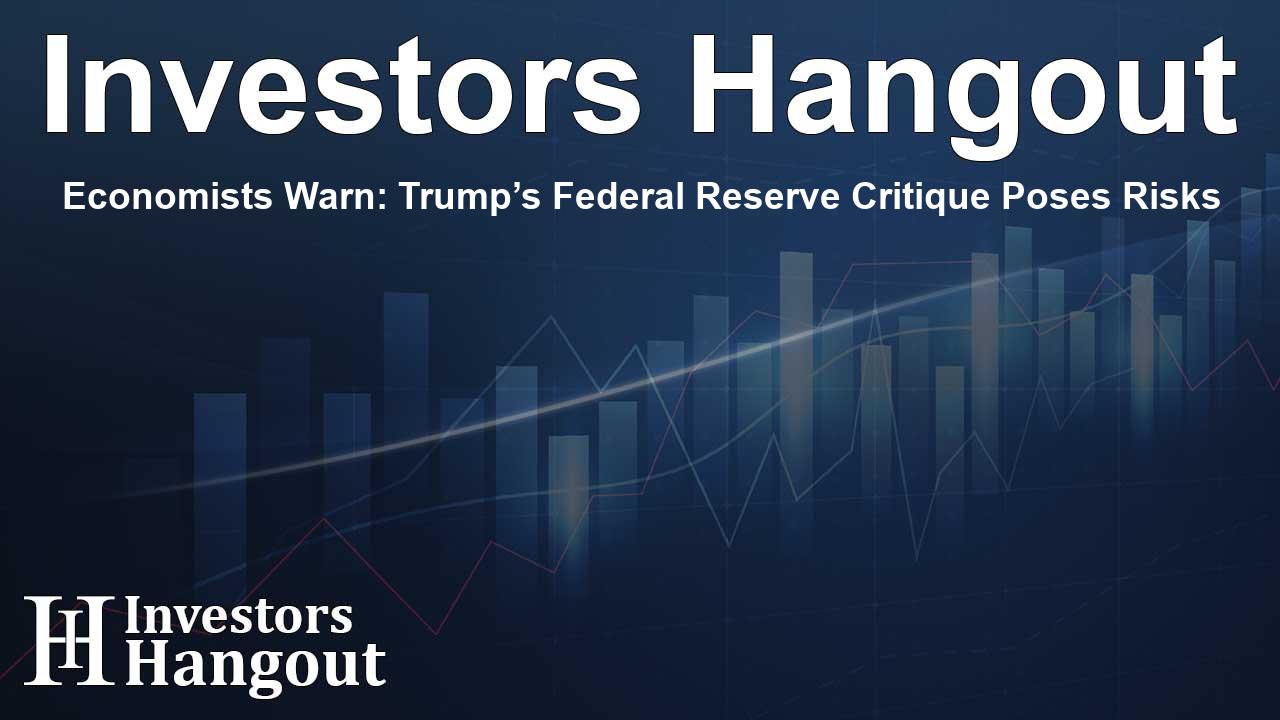Economists Warn: Trump’s Federal Reserve Critique Poses Risks

Financial Market Concerns Amid Political Turbulence
In light of ongoing political dynamics, economists are cautioning that financial markets may not be fully grasping the potential risks stemming from President Donald Trump’s ongoing critiques of the Federal Reserve. Their recent assessments suggest that there could be a heightened risk of inflation and diminishing confidence in U.S. government debt as a result of these tensions.
Echoes of Concern from Economists
A comprehensive survey involving 94 economists across the U.S. and Europe covered their apprehensions about the implications of Trump's stance on the Fed. There is a rising fear that the independence of the Federal Reserve may be jeopardized, potentially hindering its capacity to regulate interest rates and control inflation effectively. This situation could significantly alter the Fed’s focus on promoting job creation and lowering government borrowing costs.
Potential Shifts in Fed Priorities
Many economists predict that the Fed's priorities could shift permanently following the conclusion of Jerome Powell's term as Chair. Such a transformation may lead to altered policies that affect the broader economy, which is a concern voiced by several experts in the field.
Trump’s Actions and Their Economic Repercussions
Trump's persistent criticisms of the Fed, particularly regarding its interest rate policies, are viewed as escalatory factors. The dismissal of Fed governor Lisa Cook has exacerbated these concerns, as it raises questions about the extent of political influence on the central bank. Such actions have prompted fears regarding the Fed's ability to maintain its credibility and independence in a politically charged environment.
Expert Opinions on Economic Stability
Experts like Karsten Junius from J Safra Sarasin have emphasized the critical nature of these developments, suggesting that the Fed must actively defend its role to prevent a crisis in the U.S. dollar. Moreover, Derek Tang from LH Meyer points out that financial markets may not respond strongly enough to these ongoing issues, which could lead to broader instability.
Global Economic Implications of the Fed's Independence
The situation resonates beyond U.S. borders, with notable economic figures such as Christine Lagarde, President of the European Central Bank, expressing that a loss of Fed independence could pose serious global economic threats. Concerns echo the sentiment that financial markets and economies worldwide could feel the repercussions of diminished central bank authority.
Indicators of Market Performance
As these events unfold, stock market performance remains a focal point. Both the SPDR S&P 500 ETF Trust SPY and Invesco QQQ Trust Series 1 QQQ have shown significant growth, rising by 10.5% and 11.79% respectively this year. However, the volatility in government confidence can create uncertainty in these positive trends.
Looking Forward
The economic landscape is undeniably intertwined with political decisions and public sentiment regarding the Federal Reserve. As Trump continues to question the Fed's policies, the potential for a turbulent economic future looms. The impacts of these dynamics, as posited by economists, signify the importance of political environments on financial stability.
Frequently Asked Questions
What are the main concerns economists have about the Fed?
Economists are worried that Trump’s actions might threaten the Fed’s independence, leading to ineffective regulation of interest rates and inflation control.
How could Trump's actions impact inflation?
Trump's criticism of the Fed and his political maneuvers may lead to higher inflation rates and reduced investor confidence in U.S. Treasuries.
What do experts suggest about the Fed's future under these conditions?
Many experts predict that there could be a lasting shift in the Fed’s focus away from its traditional roles if Trump continues to exert influence over the institution.
Why is the Fed's independence crucial for the economy?
The Fed’s independence is vital as it allows for unbiased monetary policy that can effectively manage inflation and support economic growth without political interference.
What is the view of international figures like Christine Lagarde on this issue?
Lagarde warns that the erosion of the Fed's independence could seriously threaten global economic stability, highlighting the interconnectedness of financial systems.
About The Author
Contact Henry Turner privately here. Or send an email with ATTN: Henry Turner as the subject to contact@investorshangout.com.
About Investors Hangout
Investors Hangout is a leading online stock forum for financial discussion and learning, offering a wide range of free tools and resources. It draws in traders of all levels, who exchange market knowledge, investigate trading tactics, and keep an eye on industry developments in real time. Featuring financial articles, stock message boards, quotes, charts, company profiles, and live news updates. Through cooperative learning and a wealth of informational resources, it helps users from novices creating their first portfolios to experts honing their techniques. Join Investors Hangout today: https://investorshangout.com/
The content of this article is based on factual, publicly available information and does not represent legal, financial, or investment advice. Investors Hangout does not offer financial advice, and the author is not a licensed financial advisor. Consult a qualified advisor before making any financial or investment decisions based on this article. This article should not be considered advice to purchase, sell, or hold any securities or other investments. If any of the material provided here is inaccurate, please contact us for corrections.
